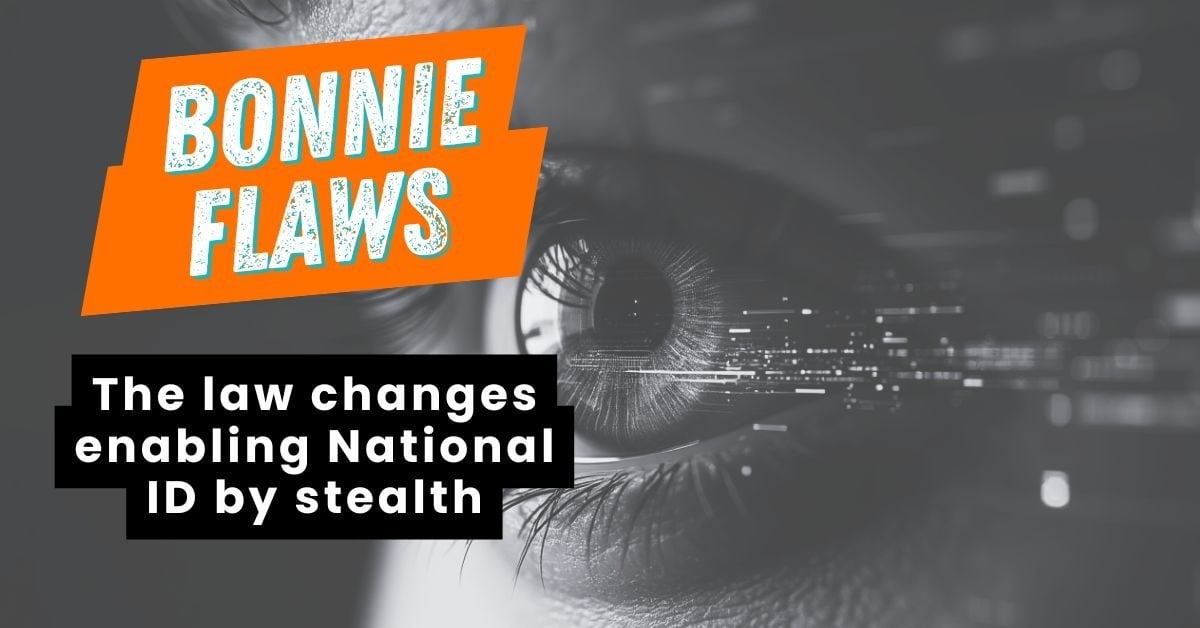
by Bonnie Flaws

One of the key points raised in my four part investigation into Stats NZ, was the legality of its Integrated Statistical Data System. Because no matter who I asked the answer was vague.
So I will update readers with what I have found out, and also address the decision to adopt an administration-data-first census, since the Government announced this last week publicly. I previously reported this here.
I asked Stats NZ:
Which parts/clauses of the Privacy Act and Data & Statistics Act sanction the creation of a real-time statistical register and persistent unique identifier? On the face of it, this doesn't seem to fit within the Privacy Principles, although I understand Stats has exemptions for some parts of the Act.
Hair-splitting terminology
The first thing we have to address is the double-speak being employed by Stats NZ to explain what it is doing.
Stats NZ says it is “not developing a ‘real-time statistical register’ … legislative change would be needed before a population register for the purpose of civil administration could be introduced in New Zealand.”
But we are dealing with flimsy technicality here. In the same response, its says:
“… unlike examples from overseas, New Zealand does not have a national identity number that can be used to link person-centred administrative data to a central population file. Legislative change would be needed for this to occur.
“Accordingly, Stats NZ is developing an Integrated Statistical Data System (ISDS) that will support linked data under social, economic and environmental domains for the production of official statistics.”
So the gist of that is that it’s not legal for them to assign a National Identity Number or build a statistical register for the purposes of ‘civil administration’ – to track individuals for compliance and enforcement purposes.
To get around this, they are linking anonymised administrative data and then probabilistically linking it using a persistent unique identifier. It’s the same thing in the end.
Persistent Unique Identifier = National Identity Number by the back door.
Given government’s ability to clear legislative barriers to achieve policy goals, it’s not out of the realms of possibility that law changes will one day be made to allow for:
- a national identity number and;
- for the register’s purposes to change from ‘statics and research’ to ‘civil administration’.
The real issue is that they are building such a register at all.
Here are the specifics for how they have got this far.
Legislative Barriers Removed
The OIA response says both the Data and Statistics Act 2022 and the Privacy Act 2020 allow for the increased use of administrative data, including for the development of the Integrated Statistical Data System, which links population, business and location data for the production of official statistics.
“More specifically, the Data and Statistics Act 2022 authorises the Government Statistician to collect and use data (including personal information) for official statistics and research, and was developed with a view to enable greater linking of data. Explicit recognition of the authority of the Government Statistician to integrate data for producing official statistics and for research was one of the recommendations in the Data and Statistics Bill’s Select Committee Report. Section 13(b) of the Act recognises that linking data to form integrated sets for the production of official statistics or for research is a function of the Government Statistician.
“Work underway also adheres to the Privacy Principles and obligations under the Privacy Act 2020. For instance, the Privacy Act 2020 makes allowance for the fact that other legislation, such as the Data and Statistics Act 2022, may require people to provide their personal information (see section 163 of the Privacy Act 2020 in relation to identity information).”
So it certainly looks like legislation has been hacked to allow for this dramatic change and for this potential state surveillance apparatus to be built. Its legitimacy is hanging on the claim that it is just for ‘statistical and research purposes’.
Enumeration census scrapped
Since the official announcement last week regarding the move to an admin-first census, I have received further information from Stats NZ.
In a September 2024 feasibility study, to establish Stats’ technical readiness to make the shift towards an admin data-first census, its cites the Statistics Act 1975 as one of four key barriers to successful implementation. This is because it prohibited or restricted the provision of certain data to the Government Statistician (presumably limiting data collection to what were historically considered legitimate statistical sources).
The passing of the Data and Statistics Act 2022 has removed legislative barriers in the Statistics Act 1975.
Stats NZ’s transparency problem
In an opinion piece in Newsroom last week, former Government Statistician Len Cook firmly takes Stats NZ to task for its lack of transparency about the changes it is making.
These changes are impossible without a statistical register.
“To have confidence in these proposals about replacing a normal census enumeration, we need to recognise that they have not yet been able to withstand independent expert validation …
“Over the last two years there has been a degree of secrecy of key papers [that has] never been seen before by a Government Statistician. It is doubtful that the statutory obligation of impartiality has been met by the release to some of these plans. This obligation has been ignored, despite the constitutional implications for the conduct of elections that Parliament will now have to sort out,” Cook says.
The key papers he refers to are the summary of public submissions from last year’s public consultation and the Future Census Independent Evaluation Panel report. Both were released last week, after the decision had been made to move to an admin-first census model, and after cabinet had approved it.
Stats NZ ignored most of the recommendations of its expert review to proceed with the admin-first census, and totally downplayed public sentiment around the potential misuse of data, reducing this feedback to a small portion of its considerations. Instead it ran ‘targeted consultation’. They knew what they wanted to do, the experts and public didn’t agree, so they held the advice it back until it was a done deal.
The result was frankly fait accompli. I will report on this separately.
Call for an independent review
In his Newsroom piece Cook called for the Royal Society to be funded to lead an independent review of the scientific integrity and validity of Stats NZ plans for the census and the statistical register.
He also made the point that Australia, Canada and the UK – the countries most like New Zealand – have no plans for an admin-first census. The countries that do this are ones with compulsory population registers and identity cards (see my recent article about why the West has traditionally rejected ID cards).
“If this proposal is not the first step in this direction, how else will full coverage of the population be assured?,” Cook asks.
Indeed.
National Identity Number by the backdoor
As Stats says above, changes to the Data and Statistics Act allow for the linking of data. This is key, because it sanctions the creation of a persistent unique identifier that can track an individual in real -time through administration data.
What is the difference, prey tell, between a persistent unique identifier and an a national ID number?
My view is, the ‘persistent unique identifier’ is the backdoor they are using to achieve a national identity number. They don’t have overt legislation for a national identity number, so they are going behind our backs, linking info from the data they already have on us and making an ID for everyone.
It’s just word play. The same way they say they are not building a real-time statistical register.
In fact, Stats already does this in the Integrated Data Infrastructure (see part one of my investigation) but it uses refresh data three or four times a year instead of real-time updates.
Now, they are moving to real-time updates, making the ID tag ‘persistent’.
By ‘real-time’, I mean the data will be transferred to the statistical register in a matter of hours or days, as the information is gathered and and passed over – not instantaneously. The ‘real-time’ terminology comes from Stats NZ’s own documents.
There is no informed consent and there is no opt-out.
Cook v Davis
I’d like to draw reader's attention to an exchange between sociologist Peter Davis (Former Prime Minister Helen Clarke’s husband) and Cook in the comments of his Newsroom article.

Davis’ comments will bring chills to anyone affected by the vaccination mandate and segregation based on vaccination status of the Covid era. Immunisation screening is precisely the kind of thing we should not allow our governments to consider if we do not want to have a repeat of those dark times.
But more importantly, it demonstrates the existence of influential people who are already eyeing up the centralisation of our personal data for uses other than what it is being sold as. Uses we may not be at all comfortable with. Davis’ comments about ‘proper oversight’ to guard against ‘surveillance’ are nice but realistically unachievable.
Cook sets him straight.

Data-anonymisation is not guaranteed in the age of hackers and artificial intelligence and our Bill of Rights was worthless during Covid when we were tracked, jabbed, segregated, locked out and locked down.
In a similar future scenario with a statistical register in place, we’d be screwed.
Originally published on Byline Babylon.
